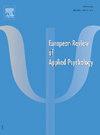A French Version of the Difficulties in Emotion Regulation Scale Short Form (F-DERS-SF): Validation in an adolescent sample
IF 1.4
4区 心理学
Q3 PSYCHOLOGY, APPLIED
European Review of Applied Psychology-Revue Europeenne De Psychologie Appliquee
Pub Date : 2025-09-25
DOI:10.1016/j.erap.2025.101119
引用次数: 0
Abstract
Introduction
Emotion dysregulation (ED) is the inability to cope with emotional experiences and leverage them in line with one’s goals. The short version of the Difficulties in Emotion Regulation scale (DERS-SF) is a commonly used measure of ED that has not yet been validated in a francophone adolescent sample.
Objective
The aim of the present study is to validate a French version of the DERS-SF (F-DERS-SF) and assess its psychometric properties in a sample of adolescents.
Method
To achieve this, 139 adolescents aged 14 to 18 (M = 16.58; SD = 0.80) completed the F-DERS-SF, a mindfulness, and an emotional distress questionnaire. A sub-sample of participants (n = 33) completed the F-DERS-SF a second time after 15 days. Factor structure, test-retest reliability, internal consistency reliability, and convergent validity were assessed. Two alternative models were run for comparison purposes.
Results
The correlated six-factor model of the original version displayed good model fit and excellent reliability and validity for all subscales except for the Awareness subscale. The alternative five-factor model excluding Awareness showed the best model fit and psychometric properties among the models tested.
Conclusion
The F-DERS-SF can be used for research and clinical purposes in a population of adolescents. The present study’s results suggest that all subscale scores can be used reliably except for the Awareness subscale. If the Awareness subscale is used, we advise a cautious interpretation of its results.
法文情绪调节困难量表简表(F-DERS-SF):在青少年样本中的验证
情绪失调(ED)是指无法处理情绪体验并利用它们来实现自己的目标。简短版本的情绪调节困难量表(DERS-SF)是一种常用的ED测量方法,尚未在讲法语的青少年样本中得到验证。目的验证法语版的心理特征量表(F-DERS-SF),并评估其在青少年样本中的心理测量特性。方法139名14 ~ 18岁青少年(M = 16.58; SD = 0.80)完成了F-DERS-SF、正念和情绪困扰问卷。参与者的子样本(n = 33)在15天后第二次完成F-DERS-SF。评估因子结构、重测信度、内部一致性信度及收敛效度。为了进行比较,我们运行了两个可供选择的模型。结果原始版本的相关六因素模型模型拟合良好,除意识子量表外,其余子量表均具有良好的信度和效度。排除意识的备选五因素模型在被测模型中表现出最佳的模型拟合和心理测量特性。结论F-DERS-SF可用于青少年人群的研究和临床目的。本研究的结果表明,所有的子量表得分可以可靠地使用,除了意识子量表。如果使用意识子量表,我们建议对其结果进行谨慎的解释。
本文章由计算机程序翻译,如有差异,请以英文原文为准。
求助全文
约1分钟内获得全文
求助全文
来源期刊

European Review of Applied Psychology-Revue Europeenne De Psychologie Appliquee
PSYCHOLOGY, APPLIED-
CiteScore
2.20
自引率
20.00%
发文量
38
期刊介绍:
The aim of the Revue européenne de Psychologie appliquée / European Review of Applied Psychology is to promote high-quality applications of psychology to all areas of specialization, and to foster exchange among researchers and professionals. Its policy is to attract a wide range of contributions, including empirical research, overviews of target issues, case studies, descriptions of instruments for research and diagnosis, and theoretical work related to applied psychology. In all cases, authors will refer to published and verificable facts, whether established in the study being reported or in earlier publications.
 求助内容:
求助内容: 应助结果提醒方式:
应助结果提醒方式:


